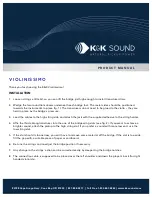
18
Handling the Instrument
As the trumpet is made of thin metal, handle the instrument carefully. Do not apply any
excessive force, or bump the instrument so as to dent or damage it.
■
Applying Oil
Apply oil to the pistons
1.
Unscrew the valve cap and pull the piston
straight out of the valve casing until about half
of the valve piston is exposed.
2.
Apply a few drops of valve oil on the piston.
* Do not apply too much oil.
3.
Slowly, return the piston into the valve casing.
At this time, make sure the number stamped
on the piston is facing the mouthpiece. After
the valve cap is tightened firmly, move the pis-
ton up and down a few times to distribute the
oil over the piston evenly.
Piston
Valve oil
* If all pistons have been removed from the valve
casings, make sure the number stamped on the
piston matches the number stamped on the casing
before returning the piston into the valve casing.
* The pistons must be oiled for them to function
properly and smoothly.
Number
Applying Oil To The Rotors
(Rotary Trumpets Only)
1.
Hold the lever down and remove the valve
slide.
* If the valve slide is removed without holding the
lever down, air pressure in the pipe drops creating
a suction that can cause poor rotor function or
damage to the inside of the pipe.
2.
Apply some rotor oil to the rotor and then move
the lever a few times to distribute the oil evenly.
* To keep oil from mixing with the slide grease or
dirt inside of the pipe, hold the oil container’s
spout so that is does not come into contact with
the inner walls of the pipe.
* Since the oil container’s spout is metallic, be care-
ful not to let the spout come into direct contact
with the rotor.
3.
Hold the lever down and replace the valve
slide.
* If you replace the valve slide without holding the
lever down, pressure built up inside the pipe can
cause poor rotor function or damage to the inside
of the pipe.
Rotor oil
Before You Play
02_trumpet_om_en.indd 18
11/09/08 18:49


































